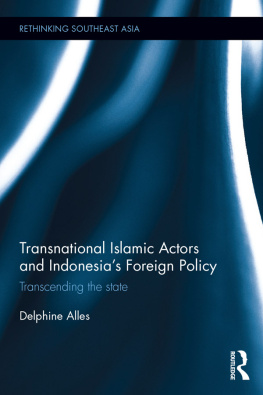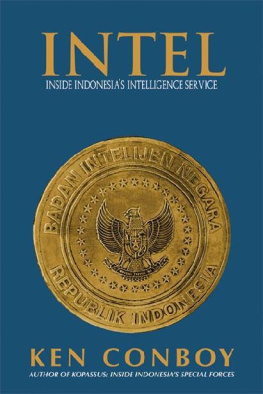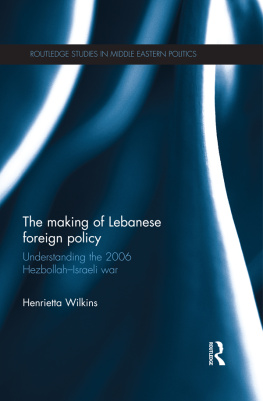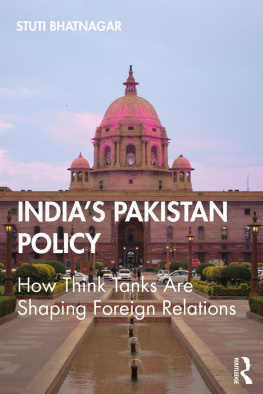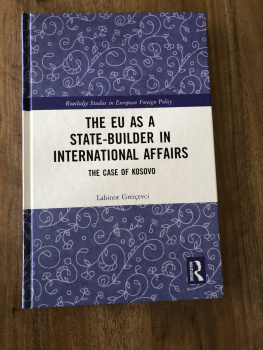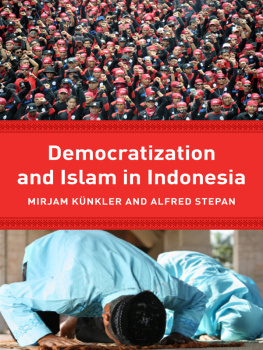Transnational Islamic Actors and Indonesias Foreign Policy
The last fifteen years have seen Indonesia move away from authoritarianism to a thriving yet imperfect democracy. During this time, the archipelago attracted international attention as the most populated Muslim-majority country in the world. As religious issues and actors have been increasingly taken into account in the analysis and conduct of international relations, particularly since the 9/11 events, Indonesias leaders have adapted to this new context.
Taking a socio-historical perspective, this book examines the growing role of transnational Islamic non-state actors in post-authoritarian Indonesia and how it has affected the making of Indonesias foreign policy since the country embarked on the democratization process in 1998. It returns to the origins of the relationship between Islamic organizations and the Indonesian institutions in order to explain the current interactions between transnational Islamic actors and the countrys official foreign policies. The book considers for the first time the interactions between the parallel or second-track diplomacy undertaken by Indonesias Islamic NSAs and the countrys official foreign policy narrative and actions. It explains the adaptation of the states responses and investigates the outcomes of those responses on the countrys international identity. Combining field-collected data and theoretical reflection, it offers a distanced analysis which deepens theoretical approaches on transnational religious actors.
Providing original research in Asian studies, while filling an empirical gap in international relations theory, this book will be of interest to scholars of Indonesian studies, Islamic studies, international relations and Asian politics.
Delphine Alles is Professor of Political Science at Universit Paris-Est, France and teaches international relations and Asian politics at Sciences Po Paris, France. She is a senior research fellow at LIPHA (Hannah Arendt Interdisciplinary Institute for the Study of Politics, Universit Paris-Est) and IRSEM (The Institute for Strategic Research, Paris).
Rethinking Southeast Asia
Edited by Duncan McCargo, University of Leeds, UK
Southeast Asia is a dynamic and rapidly changing region which continues to defy predictions and challenge formulaic understandings. This series publishes cutting-edge work on the region, providing a venue for books that are readable, topical, interdisciplinary and critical of conventional views. It aims to communicate the energy, contestations and ambiguities that make Southeast Asia both consistently fascinating and sometimes potentially disturbing.
Some titles in the series address the needs of students and teachers, published simultaneously in hardback and paperback, including:
Rethinking Vietnam
Duncan McCargo
Rethinking Southeast Asia is also a forum for innovative new research intended for a more specialist readership. Titles are published initially in hardback.
1Politics and the Press in Thailand
Media machinations
Duncan McCargo
2Democracy and National Identity in Thailand
Michael Kelly Connors
3The Politics of NGOs in Indonesia
Developing democracy and managing a movement
Bob S. Hadiwinata
4Changing Political Economy of Vietnam
The case of Ho Chi Minh City
Martin Gainsborough
5Military Politics and Democratization in Indonesia*
Jun Honna
6Living at the Edge of Thai Society*
The Karen in the highlands of Northern Thailand
Claudio O. Delang
7Thailand Beyond the Crisis*
Peter Warr
8Virtual Thailand*
Media and culture politics in Thailand, Malaysia and Singapore
Glen Lewis
9Decentralization and Adat Revivalism in Indonesia*
The politics of becoming indigenous
Adam D. Tyson
10Truth on Trial in Thailand*
Defamation, treason, and lse-majest
David Streckfuss
11Civil Society in the Philippines
Theoretical, methodological and policy debates
Gerard Clarke
12Politics and Governance in Indonesia
The police in the era of Reformasi
Muradi
13Transnational Islamic Actors and Indonesias Foreign Policy
Transcending the state
Delphine Alles
*available in paperback
First published 2016
by Routledge
2 Park Square, Milton Park, Abingdon, Oxon OX14 4RN
and by Routledge
711 Third Avenue, New York, NY 10017
Routledge is an imprint of the Taylor & Francis Group, an informa business
2016 Delphine Alles
The right of Delphine Alles to be identified as author of this work has been asserted by her in accordance with sections 77 and 78 of the Copyright, Designs and Patents Act 1988.
All rights reserved. No part of this book may be reprinted or reproduced or utilised in any form or by any electronic, mechanical, or other means, now known or hereafter invented, including photocopying and recording, or in any information storage or retrieval system, without permission in writing from the publishers.
Trademark notice: Product or corporate names may be trademarks or registered trademarks, and are used only for identification and explanation without intent to infringe.
British Library Cataloguing in Publication Data
A catalogue record for this book is available from the British Library
Library of Congress Cataloging-in-Publication Data
A catalog record has been requested for this book
ISBN: 978-0-415-56026-9 (hbk)
ISBN: 978-1-315-76498-6 (ebk)
Typeset in Times New Roman
by Apex CoVantage, LLC
This book owes its existence to Dr. Rizal Sukma, Executive Director of Jakartas Centre for Security and International Studies, who welcomed me in his Tanah Abang office where I had candidly stepped on my first field research in Indonesia in 2008. Within a few weeks, Rizals humour and critical perspectives contributed to enrich of my vision of Indonesias socio-political sphere, more than the dozen books I had read before arriving on the archipelagos territory. While I kept on promoting a sociological and transnational approach for the study of international relations, Rizal defended the English School perspective. The idea emerged of pursuing together the path he had opened with his own book, Islam in Indonesias Foreign Policy (Routledge, 2003), by focusing on the interactions between non-state actors and official foreign policy narratives and practices. As Rizals academic, administrative and political responsibilities progressively piled up, they did not leave him with enough time to pursue this initially common endeavour. It is nevertheless thanks to his impulse that the project was concretized and through our long exchanges that the first version of its structure was shaped for which I remain tremendously grateful. As this project progressed, Duncan McCargo knew how and when to inquire and encourage to ensure that the final point would finally be typed. With Gwenael Njoto-Feillard, they provided constructive feedback which was critical in helping me shape the final version of the manuscript. The benevolent attention and example of Professor Bertrand Badie, who supervised the PhD thesis from which this book is partially extracted, have been major impulses for my work. I am also indebted to the many actors from the Indonesian civil society and various national administrations who kindly agreed to share their time and experience during interviews and left many black boxes partially ajar by allowing me to attend some of their meetings. I also wish to thank Routledges editors for their patience as I was struggling with the arcanes of the writing process. The concretization of this research would not have been possible without the support of the institutions which have hosted or funded my research, both in France and Indonesia: Sciences Po Paris, IRSEM and Universit Paris Est in France, CSIS and EFEO in Jakarta. Marians tolerance and support patience also proved essential at every step of the way. Although the result is considerably greater than it would have been without these impulses and supports, I fully assume responsibility for its remaining weaknesses.

